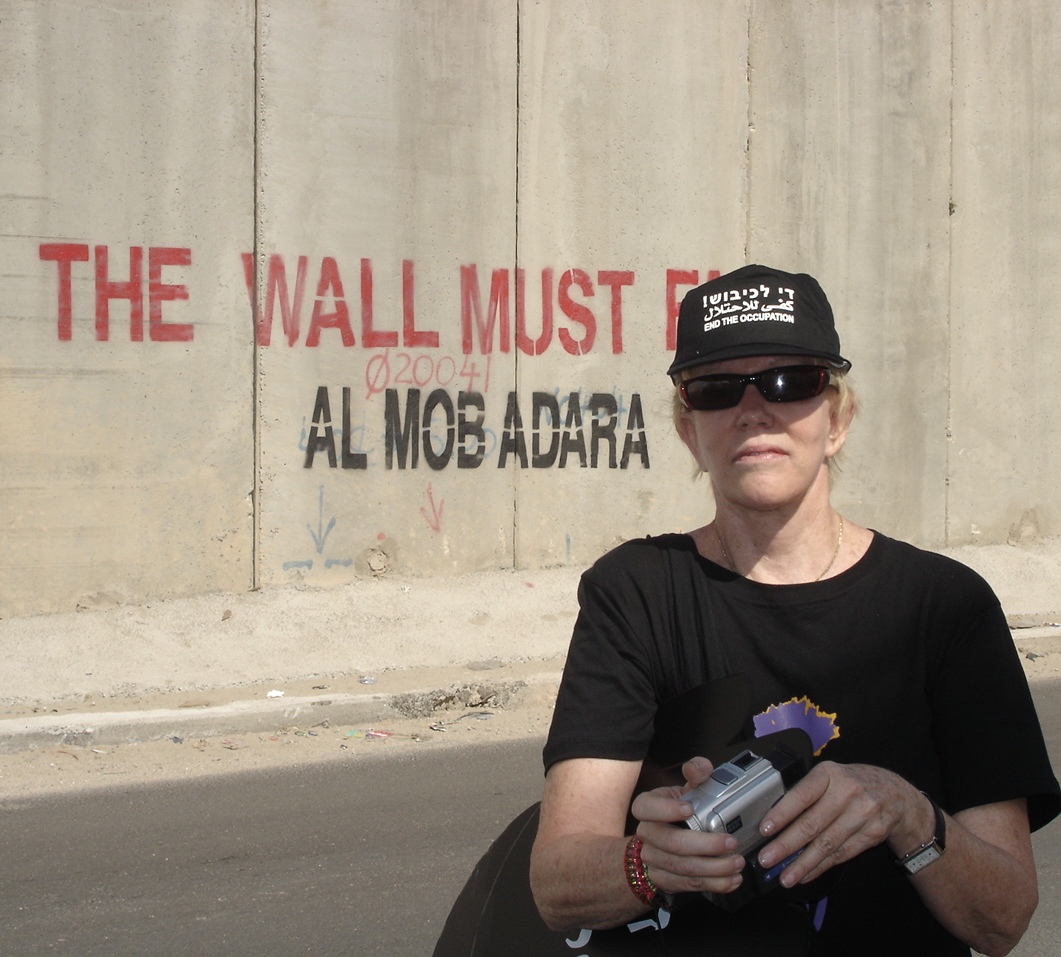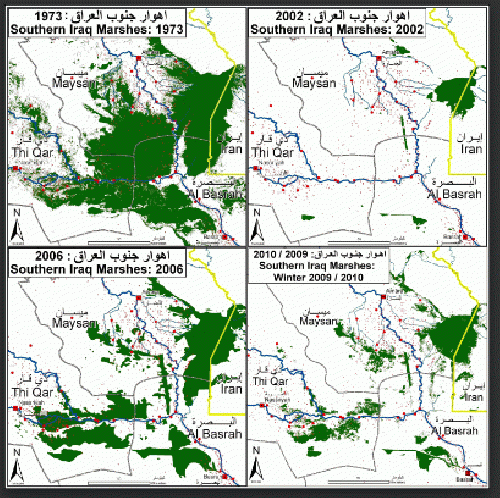For centuries, the Marsh Arabs of Southern Iraq had lived and thrived in the cup of land between the Tigris and Euphrates rivers and also in the marshes of East Tigris, South Euphrates (Hiwazeh marsh & Hammar marsh). Their community separated into the herders (mostly of water buffalos and cows) and farmers, who planted rice in the lush ankle-thick waters surrounding their reed homes. Homes were hand-built, using those reeds and were usually just one long room, often separated in the middle, so the family lived at one end and the animals came in for shelter during the colder months at the other end.
Everyone shared in the work, women planting, herding and poling the boats they used for transportation. Looking like a cross between an Italian gondola and a canoe, these boats were practical, sturdy and capable of carrying meters of reeds or bags of supplies. Until the early 20th century, only long, shaved poles moved the boats propelled by someone at the back. Until outboard motors came along, sometime around WW I, boats moved silently through the waters, the major connection between homes, communities and the outside world.
Our small group of Iraqis and internationals from Sami Rasouli's Reconciliation English class1 wanted to see for ourselves what the Marsh Arab communities looked like and how they lived. So on a bright and sunny morning in October, we drove to meet consultant Engineer Jassim Al-Asadi, the managing director and water expert of Nature Iraq's Southern operations. We met him in his office, covered with maps of the marshes and with books everywhere. He would be our history professor/guide for the day.
"Ever since the end of WW I when the West carved up the Ottoman Empire, these marshes and the way of life here has been in danger of disappearing. " He said. "The people count on the natural flow of water, mostly from the Euphrates & Tigris river, to maintain their lifestyles and provide them with food, shelter and some income. But the marshes have continued to shrink, water is ever more precious, and war, invasion, and other countries like Turkey building dams on the Euphrates river far upstream from these marches have steadily changed the face and the destiny of the area."
Seven of us clamored into the two boats gently rocking at the edge of mud flats, being careful to stay in the center of each seat so it didn't tip over. And we were off, the water had very few ripples other than the ones made by the boats, and the reeds along the edges of the canal kissed their reflections, it was that clear. We could see birds perched along the tops of some of the marsh weeds, another indication that the marshes were coming back to life.
Jassim hopped from boat to boat, all the while talking to us about the marsh. "We are only in a canal right now," he said, "after the fall of Saddam in 2003, Iraq began a process of trying to reclaim much of the marshes. This canal we're on was dredged some months ago, and you can see some of the equipment to your left pulling the mud out of the river bed to help the local population remain permanent and continue their economic activities within the Marshlands."
Back in the early 90's, Saddam was convinced the Marsh Arabs were hiding Shia rebels and built soil embankments to dry out the marshes and then built long paved roads for his military equipment to use any time he wanted (when he wasn't strafing the villagers and killing their animals). He sealed off the livelihood of the people living there. Over 300,000 were literally marched out of the wetlands, fleeing to Iran and other villages in Iraq. By the beginning of 2000, what was once over 10,000 square kilometers (3850 square miles) of marsh had been reduced to practically nothing.
The pilots aimed our canoe boats up onto the shores of what looked like a dilapidated asphalt single-lane highway with a home built smack in the middle of it. We were going to meet a family, walk through their simple home and see what they were raising. As we took our shoes off and walked into their one-room home, we could see electricity cables coming into it, the result of running power off a generator in the back of the house. This generation has new possibilities in an area that once had no running water, no power, and no schools or hospitals.
Although children now attend school in small spurts, it's no worse than many of the places in Iraq where children go only a half-day because the government can't afford to feed them lunch or areas where there are more kids than there are schools. Iraq, after all, is still recuperating from the 14 years of American-led war that has decimated the country. Over the past decade, local efforts to re-flood the area and help from environmental agencies have replenished about half the wetlands. Wildlife and Marsh Arabs, native to the wetlands for 6000 years, have begun to return home. In July 2017, Iraq's marshes were listed as a UNESCO world heritage site in hopes world attention would bring in money and experts. So far, that has not happened.
As we carefully climbed back into the canoes, Jassim told the pilots to head for open waters and away from the canals, just so we could see how beautiful the marshes were. As the native people come back, most have decided to rebuild along those asphalt roads Saddam tore through the area, because those roads are safer than being out in the open waters.
The boats glided along and Jassim told us what some of the real problems were facing this community. "There are three reasons it's going to be difficult to rebuild the way we would like. The first is water management. There just isn't any, and planting rice takes huge amounts of water. Second, are the dams other countries are building along the Euphrates, sucking up much of the water resources that used to flood these plains and provide the people living here a means to grow crops. And third, Iraq is recovering from 38 years of sanctions, war and their aftermath. We are not a high priority yet. "
As we turned around to head back to our cars, trailing our fingers in the cool waters of this marsh, we couldn't help but wonder if the people and their lifestyle would survive the conflicts of the wider world around them. After six millennia of living and working the marshes, the tragedy of losing what is now identified as a UNESCO heritage site would be devastating. Jassim believes that, with good water management, they have a chance at survival.






